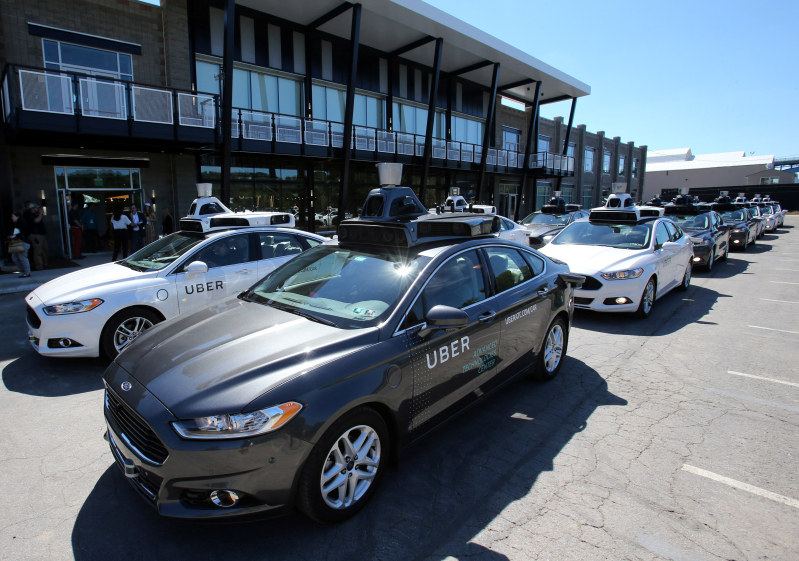
When Pittsburgh wakes up on Wednesday morning, some residents will have the choice of going about their day in an Uber that drives itself.
The launch of Uber's self-driving pilot program marks the public unveiling of the company's secretive work in autonomous vehicles and the first time self-driving cars have been so freely available to the U.S. public.
More than two years ago Uber - like most in the car business - identified autonomous driving technology as the springboard for the next stage of growth.
The aggressive San Francisco-based startup has already shaken up the world's taxi services, earning a valuation of $68 billion. It plans ultimately to replace many of its 1.5 million drivers with autonomous vehicles.
But it is not as if robots are taking over the Steel City. There will be only four self-driving vehicles available to passengers, to start, and two people will sit in the front to take over driving when the car cannot steer itself.
Uber provided ride-alongs to reporters on Tuesday. During a ride of about one hour, Reuters observed the Uber car safely - and for the most part smoothly - stop at red lights and accelerate at green lights, travel over a bridge, move around a mail truck and slow for a driver opening a car door on a busy street. All without a person touching the controls.
But the Uber driver and the engineer in the front two seats did intervene every few miles.
Since opening its Advanced Technologies Center in Pittsburgh last year, San Francisco-based Uber has moved quickly, hiring away some 40 faculty and researchers from Carnegie Mellon University - a move that ruffled feathers locally - and forming partnerships with automakers including Volvo.
But the company is competing in a crowded field. From Alphabet Inc <GOOGL.O> and Baidu Inc <BIDU.O> to Tesla Motors Inc <TSLA.O> and General Motors Co <GM.N>, technology companies and automakers are hustling to build autonomous vehicles and develop new business plans for what is expected to be a long-term makeover of personal transportation.
By integrating self-driving cars with its ride-services app, Uber may be the first introduction to autonomous cars that many people will have.
"If Uber scores a home run with this it's going to be wonderful for the planet," said Andrew Moore, dean of the School of Computer Science at Carnegie Mellon. "The reason is we will see a much safer world and much more efficient world where we have to use less energy to move people around."
Still, Moore said at least another decade of research and development is needed before there would be a significant number of truly autonomous cars on the road. Industry executives remain sharply divided on the timeline, with some expecting fully autonomous cars within five years and others predicting they are still decades away.
"I don't think that Uber by any means has it in the bag," Moore said.
A DOUBLE BLACK DIAMOND
Uber's Pittsburgh fleet consists of Ford Fusion cars outfitted with 3D cameras, global positioning systems (GPS) and a technology called lidar that uses lasers to assess the shape and distance of objects, mounted somewhat crudely to the vehicle's roof. The company is also outfitting Volvo SUVs that will be added to the fleet.
The cars do drive themselves, but during Reuters' ride-along, the Uber driver in the front seat took control, according to company protocol, to allow pedestrians to cross the street, maneuver through a construction zone and make a left turn across traffic at an intersection. An Uber engineer sat in the passenger seat, occasionally adjusting the speed of the car, which mostly drove slowly.
While autonomous driving on highways is relatively easy - Carnegie Mellon researchers built a minivan that in 1995 drove itself across the country and remained in autonomous mode about 98 percent of the time - city streets, with their traffic, pedestrians, potholes and construction, are a different matter.
"Since the mid-90s pretty much this entire field has been focused on doing that last step," said Aaron Steinfeld, associate research professor at the Robotics Institute at Carnegie Mellon.
Pittsburgh in particular poses challenges. The city is full of steep and narrow streets, potholes, tunnels and more than 440 bridges. It has snow and ice in the winter, blossoming trees that can hide street signs and traffic signals in the spring, blinding sun in the summer and a slippery ground cover of fallen leaves in the autumn.
"We really feel that Pittsburgh is the double black diamond of driving," said Raffi Krikorian, director of Uber's Advanced Technologies Center.
Pittsburgh also offers Uber a welcoming mayor and city leadership, who have rolled out the red carpet for Uber and a state law that allows for autonomous cars, as long as someone is behind the wheel to take over if needed.
Among the residents, there are mixed responses. On the ride-along, some stared at the autonomous car with mouth-gaping awe; another gave the car the middle finger.
Others, like Robert Armitage, 55 and a lifelong resident of Pittsburgh, are excited for his city - but skeptical of Uber's ambitions.
"I am absolutely skeptical as to whether they can pull it off in the winter, he said. "Pittsburgh is awfully far north for this kind of experiment."







